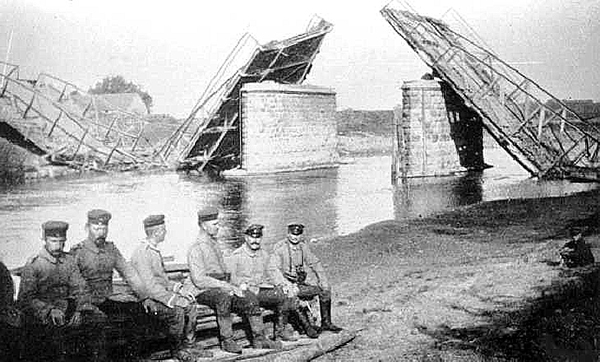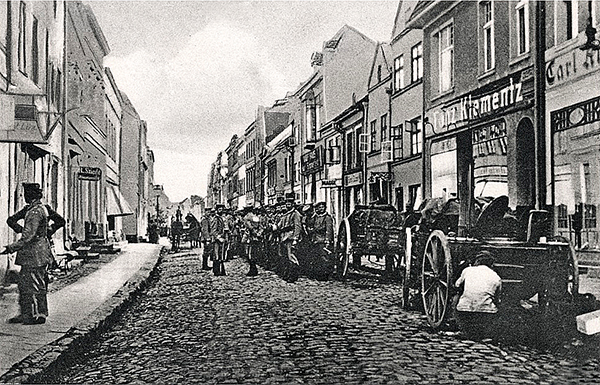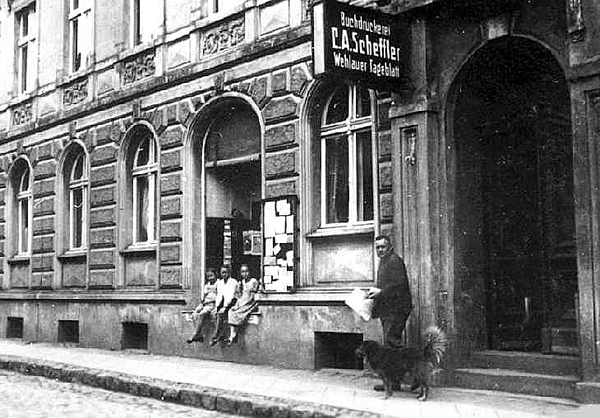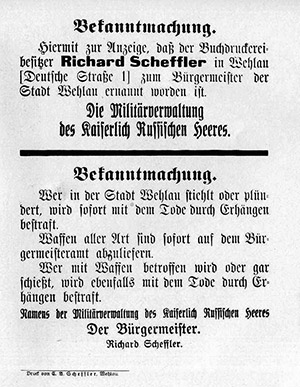Russian troops in Wehlau 1914
On August 1, 1914, Russia entered the First World War. And already on Sunday, August 23, 1914, panic began among the residents of Wehlau, caused by the approach of Russian troops. The flight of the civilian population to Königsberg began. People walked, rode bicycles and carts. The only train from Wehlau to Königsberg was overcrowded. Chaos reigned in Wehlau on August 24. The city was overcrowded with refugees from the eastern regions and soldiers of the retreating German units. The next day at 9:32 am, the Long Bridge (Lange Brücke - bridge over the Pregel River) was blown up. However, this did not help, and already on August 25, Russian troops entered the city. The owner of the local printing house and the mayor of Wehlau, Richard Scheffler, managed to negotiate with the Russian command to prevent possible looting. On August 30, Scheffler assured General Rannenkampf's adjutant, Lieutenant Sievert, that order would be maintained among the civilian population in Wehlau. As a guarantee, two hostages from among the townspeople were given to the Russian army commandant. After the occupation authorities were satisfied with the cooperation with the German assistants, the town was allowed to reintroduce self-government.


The owner of a tannery, Gustav Meyer Rendant, was appointed deputy mayor, and the accountant Kurt Scheffler became city secretary. 10 citizens acted as police officers, for which they were given white armbands.

The new city government had a hard time. Not only the Russians, but also the German refugees, who often acted in collusion with the Russians, caused trouble. But in the fight against marauders, the city police received support from the military command and officers. The population lived under certain restrictions and the need to maintain loyalty to the military. But in general, the life of the city residents remained bearable, despite the uncertainty and individual cases of soldiers confiscating beds and blankets to more comfortably equip their firing positions. In the first days of September 1914, there were cases of arson on Kirchenstrasse. On September 6, a Russian officer stole the imperial banner of the Union of Former Frontline Soldiers of the Krais Wehlau from the city church. On September 10, a fire broke out in Pinnau (a district in the southern part of Wehlau), and then the Russian troops left the city, having blown up the bridge over the Alle River before doing so. The flour warehouses in Pinnau burned down completely. At midday, the German cavalry entered Wehlau to the general jubilation of the townspeople.
In his memorial speech, Richard Scheffler said: “May all wars and misfortunes continue to pass our beloved Wehlau by!”
(source: Wehlauer Heimatbrief, No. 91, 2014)

Announcement
This is to inform you that the owner of the printing house Richard Scheffler (Wehlau, Deutsche Strasse 1) has been appointed mayor of the city of Wehlau.
Military administration of the Imperial Russian Army.
Announcement
Anyone who commits theft or looting in the city of Wehlau will be immediately punished by death by hanging.
Any type of weapon must be immediately delivered and handed over to the mayor's office.
Anyone who is caught with a weapon, and especially who starts firing shots, is also punishable by death by hanging.
In the name of the military administration of the Imperial Russian Army
Mayor Richard Scheffler
